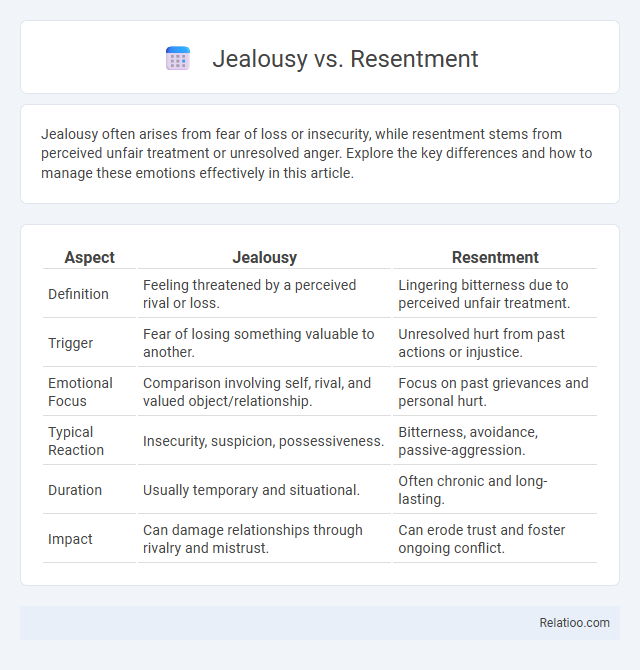Jealousy often arises from fear of loss or insecurity, while resentment stems from perceived unfair treatment or unresolved anger. Explore the key differences and how to manage these emotions effectively in this article.
Table of Comparison
| Aspect | Jealousy | Resentment |
|---|---|---|
| Definition | Feeling threatened by a perceived rival or loss. | Lingering bitterness due to perceived unfair treatment. |
| Trigger | Fear of losing something valuable to another. | Unresolved hurt from past actions or injustice. |
| Emotional Focus | Comparison involving self, rival, and valued object/relationship. | Focus on past grievances and personal hurt. |
| Typical Reaction | Insecurity, suspicion, possessiveness. | Bitterness, avoidance, passive-aggression. |
| Duration | Usually temporary and situational. | Often chronic and long-lasting. |
| Impact | Can damage relationships through rivalry and mistrust. | Can erode trust and foster ongoing conflict. |
Defining Jealousy: Core Concepts and Triggers
Jealousy is an emotional response that arises from the fear of losing something valuable, usually a relationship or status, to a perceived rival. Core concepts of jealousy involve insecurity, possessiveness, and suspicion, often triggered by comparisons, perceived threats, or lack of trust. Understanding your jealousy requires recognizing these triggers and differentiating them from resentment, which stems from perceived unfair treatment, and grievance, which is a formal complaint about injustice.
Understanding Resentment: Key Characteristics
Resentment is a deep-seated emotional response arising from perceived unfair treatment or injustice, often festering over time and impacting your mental well-being. It differs from jealousy, which involves envy of another's advantages, and grievance, which centers on formal complaints or perceived wrongs. Understanding resentment's key characteristics--such as persistent bitterness and internalized anger--can help you address and resolve these feelings more effectively.
Psychological Roots of Jealousy
Jealousy stems from an intense fear of losing something valuable to you, often rooted in attachment insecurities and self-esteem issues. Unlike resentment, which arises from perceived unfair treatment, or grievance, linked to a sense of injustice, jealousy is tied directly to emotional vulnerability and comparison. Understanding your psychological roots of jealousy can help in managing feelings and fostering healthier emotional responses.
The Origins of Resentment in Relationships
Resentment in relationships often originates from perceived injustices, unmet expectations, or unresolved conflicts that accumulate over time, fostering bitterness and emotional distance. Unlike jealousy, which stems from insecurity or fear of loss, resentment is deeply tied to feelings of being wronged or neglected, creating a lasting impact on trust and communication. Addressing resentment requires open dialogue and empathy to heal underlying wounds and restore relational harmony.
Emotional Symptoms: Jealousy vs. Resentment
Jealousy often triggers intense feelings of insecurity, fear, and anxiety, manifesting as emotional distress over perceived threats to your relationships or status. Resentment, by contrast, involves bitterness and persistent anger resulting from perceived unfair treatment or injustice. Both emotions can create emotional turmoil but differ in their root causes and the way they affect your mental well-being.
Behavioral Patterns of Jealousy and Resentment
Jealousy often triggers possessive behaviors, hyper-vigilance, and emotional insecurity when You perceive a threat to a valued relationship, driving attempts to control or undermine others. Resentment, by contrast, manifests through passive-aggressive actions, withdrawal, or chronic bitterness stemming from perceived injustices or unaddressed grievances. Understanding these distinct behavioral patterns can help in managing interpersonal conflicts and emotional responses effectively.
Jealousy in Romantic and Platonic Connections
Jealousy in romantic and platonic connections often stems from perceived threats to valued relationships, triggering insecurity and fear of loss. This emotion differs from resentment, which arises from feelings of unfair treatment, and grievance, rooted in a sense of injustice or wrongdoing. Understanding jealousy's impact on trust and communication is crucial for maintaining healthy and supportive bonds.
How Resentment Grows Over Time
Resentment grows over time as unresolved feelings of injustice or hurt fester silently, often unnoticed until they become deeply ingrained in Your emotional landscape. Unlike jealousy, which is a more immediate response to perceived threats, resentment accumulates through repeated slights, unaddressed grievances, or lingering bitterness. This slow build-up can distort relationships, fostering a cycle of negativity that undermines trust and communication.
Strategies for Managing Jealousy and Resentment
Addressing jealousy and resentment effectively requires developing self-awareness and practicing emotional regulation techniques such as mindfulness and cognitive reframing. You can manage these emotions by setting healthy boundaries and fostering open communication to prevent misunderstandings that lead to resentment. Building empathy and focusing on gratitude also diminishes negative feelings, promoting emotional well-being and healthier relationships.
Healing and Moving Forward: Building Healthier Bonds
Jealousy, resentment, and grievance each stem from different emotional triggers but can damage relationships if left unaddressed. Healing requires acknowledging your feelings, practicing empathy, and fostering open communication to rebuild trust. Moving forward involves setting boundaries and prioritizing self-awareness to cultivate healthier, more resilient bonds.

Infographic: Jealousy vs Resentment
 relatioo.com
relatioo.com